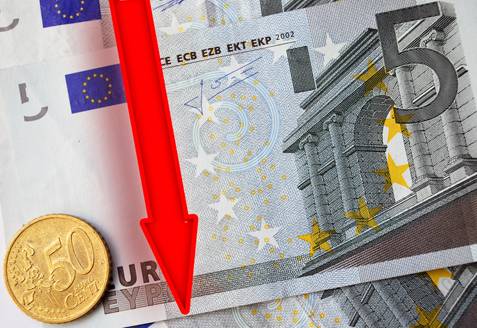
Introduction
The Euro’s Slide extended its losses in American trade on Thursday for the second day against the dollar, plumbing a four-month trough following the remarks by ECB President Christine Lagarde. In this article, we will delve into the factors driving this decline and its implications for the market.
Euro’s Slide A Shifting Landscape
- Lagarde’s Statement: ECB President Christine Lagarde recently stated that interest rates have reached a constraining level that should be sufficient to control inflation in the medium term.
- Market Speculation: This statement triggered speculation in the market that the ECB might be nearing the end of its policy tightening cycle.
- Bank of England’s Move: The ECB’s announcement came on the heels of a surprise decision by the Bank of England to raise interest rates by 25 basis points to 4.50%, the highest level since 2001.
EUR/USD Exchange Rate
- Euro’s Decline: The EUR/USD exchange rate fell 0.7% on that day to 1.0654, marking its lowest level since May. It had reached a session-high at 1.0752.
- Previous Gains: Prior to this decline, the pair had been on an upward trajectory, with a 0.25% gain the previous day, breaking a four-day streak.
Christine Lagarde’s Insights
- Inflation Control: Lagarde emphasized that ECB members believe the current interest rates will play a pivotal role in controlling inflation and bringing it back to the target rate of 2%.
- Data-Driven Approach: The ECB plans to continue relying on economic data to determine the duration of the current high-interest rate policy.
Euro’s Slide Economic Outlook
- Growth Forecast: Despite the rate hike and inflation control efforts, the ECB cut its growth forecasts for this year from 0.9% to 0.7%.
- Recovery Expectations: However, there’s optimism that the Eurozone’s economy will rebound in the second half of the year, potentially influencing the ECB’s future decisions.
The Uncertainty of Euro’s Slide
- No Confirmation: It’s important to note that there’s no official confirmation that interest rates have peaked. The situation remains fluid.
-
Inflation Outlook: The ECB stated in its policy press release that despite signs of slowing inflation
it anticipates that inflation will remain high for an extended duration. - Data-Driven Decisions: The central bank emphasized that forthcoming decisions will heavily rely on economic data to determine the appropriate level and duration of high-interest rates.
Euro’s Slide Conclusion
In conclusion, the Euro’s recent decline against the dollar is a result of a complex interplay of factors
including Lagarde’s statement, the Bank of England’s decision, and the ongoing uncertainty in the global economic landscape. While the ECB remains vigilant in its efforts to control inflation, the market continues to watch closely, awaiting further developments.
FAQs
1. Why did the Euro decline following Lagarde’s statement?
The Euro declined as Lagarde’s statement led to speculation that the ECB might be near the end of its policy tightening cycle
causing uncertainty in the market.
2. How did the Bank of England’s decision impact the Euro?
The Bank of England’s decision to raise interest rates to their highest level since 2001 added to the Euro’s downward pressure
as it signaled a broader trend of interest rate hikes.
3. What is the significance of the EUR/USD exchange rate reaching a four-month low?
A four-month low suggests that the Euro is losing value against the dollar
which can impact international trade, investments, and economic stability.
4. How does the ECB plan to control inflation?
The ECB aims to control inflation by maintaining high-interest rates
as stated by ECB President Christine Lagarde. They will continue to rely on economic data for guidance.
5. What should investors and businesses watch for in the coming months?
Investors and businesses should closely monitor economic data
ECB announcements, and global economic trends, as they will influence the Euro’s performance in the near future.
